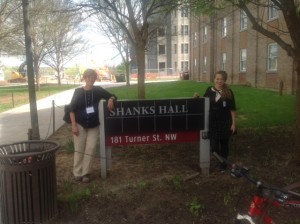Posts tagged Paul Kei Matsuda
2015 Blue Ridge Symposium
 On April 18th, I had the privilege to attend the 2015 Blue Ridge Symposium at Virginia Tech. The original date in February was cancelled due to snow, but it was certainly worth the wait.
On April 18th, I had the privilege to attend the 2015 Blue Ridge Symposium at Virginia Tech. The original date in February was cancelled due to snow, but it was certainly worth the wait.
The symposium consisted of two keynote speakers, Paul Kei Matsuda and Alexis Hart, as well as a panel of graduate students attending (and teaching) at Virginia Tech. This year’s subject was diversity in the college classroom, first generation college students, and L2 learners (students whose first language is something other than English. This term is preferred to ESL generally, and I honestly agree with it because referring to a student as “ESL” prioritizes English over their first language–which shouldn’t be the case).
One of Matsuda’s major points regarded the myth of a homogenous university, and the importance of college instructors learning to accommodate the increase of L2 writers in the classroom. Also, understanding the different cultural values students will bring in and how that changes their perception. For instance, plagiarism. I have been warned about the repercussions of plagiarism throughout my education, but the ideas about intellectual integrity vary from culture to culture, thus, making it an even more complex issue to deal with in the classroom. Matsuda also suggested college instructors perhaps learn ways that they can accommodate L2 learners in their classroom, and I think he’s absolutely right in that.
Alexis Hart’s talk regarding student veterans was particularly compelling to me because I haven’t really thought about the diversity they contribute to a classroom, but thinking about it now they really do. Veteran students have very different experiences that will influence their presence in the classroom, as well as their approach to academic work. In my personal experience, friends of mine who are student veterans tend to be much more mature, however, as Hart’s talk emphasizes, it’s much more complex than that. She suggests that college instructors make sure student veterans know what resources their university has for them, both academically and emotionally. I really liked her suggestions for college instructors as far as accommodating veteran students. One that I particularly liked was to have the syllabus available before the course begins so they can know what they’re in for, particularly if the class plans to cover something triggering they can drop the class, or speak to the professor in advance.
One of my favorite suggestions for helping L2 learners’ writing process is to allow them to pre-write and draft in their first language, and then to write their final papers in English. Matsuda also suggests allowing students to use academic sources in other languages.
Many thanks to my professor, Dr. Lettner-Rust, for such a great opportunity! I certainly learned a lot about what to consider for my own future classrooms. Also, free books! Who wouldn’t love a conference with free books?